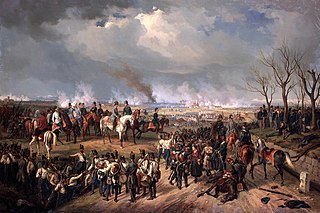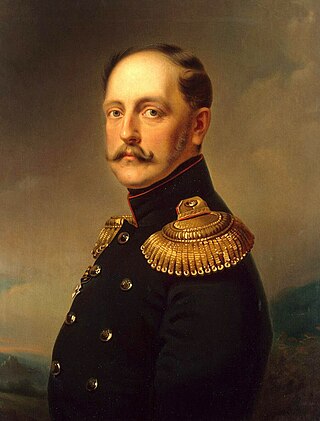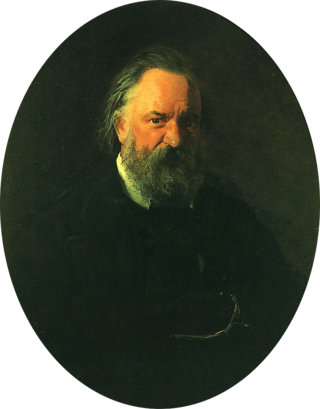
The Russian Revolution was a period of political and social change in Russia, starting in 1917. This period saw Russia abolish its monarchy and adopt a socialist form of government following two successive revolutions and a civil war. It can also be seen as the precursor for the other revolutions that occurred in the aftermath of World War I, such as the German Revolution of 1918–1919. The Russian Revolution was one of the key events of the 20th century.

1848 (MDCCCXLVIII) was a leap year starting on Saturday of the Gregorian calendar and a leap year starting on Thursday of the Julian calendar, the 1848th year of the Common Era (CE) and Anno Domini (AD) designations, the 848th year of the 2nd millennium, the 48th year of the 19th century, and the 9th year of the 1840s decade. As of the start of 1848, the Gregorian calendar was 12 days ahead of the Julian calendar, which remained in localized use until 1923.

1849 (MDCCCXLIX) was a common year starting on Monday of the Gregorian calendar and a common year starting on Saturday of the Julian calendar, the 1849th year of the Common Era (CE) and Anno Domini (AD) designations, the 849th year of the 2nd millennium, the 49th year of the 19th century, and the 10th and last year of the 1840s decade. As of the start of 1849, the Gregorian calendar was 12 days ahead of the Julian calendar, which remained in localized use until 1923.

Nicholas I was Emperor of Russia, King of Congress Poland, and Grand Duke of Finland. He was the third son of Paul I and younger brother of his predecessor, Alexander I. Nicholas's thirty-year reign began with the failed Decembrist revolt. He is mainly remembered as a reactionary whose controversial reign was marked by geographical expansion, centralisation of administrative policies, and repression of dissent both in Russia and among its neighbors. Nicholas had a happy marriage that produced a large family; with all of their seven children surviving childhood.

Absolute monarchy is a form of monarchy in which the sovereign is the sole source of political power, unconstrained by constitutions, legislatures or other checks on their authority.

The Napoleonic era is a period in the history of France and Europe. It is generally classified as including the fourth and final stage of the French Revolution, the first being the National Assembly, the second being the Legislative Assembly, and the third being the Directory. The Napoleonic era begins roughly with Napoleon Bonaparte's coup d'état, overthrowing the Directory, establishing the French Consulate, and ends during the Hundred Days and his defeat at the Battle of Waterloo. The Congress of Vienna soon set out to restore Europe to pre-French Revolution days. Napoleon brought political stability to a land torn by revolution and war. He made peace with the Roman Catholic Church and reversed the most radical religious policies of the Convention. In 1804 Napoleon promulgated the Civil Code, a revised body of civil law, which also helped stabilize French society. The Civil Code affirmed the political and legal equality of all adult men and established a merit-based society in which individuals advanced in education and employment because of talent rather than birth or social standing. The Civil Code confirmed many of the moderate revolutionary policies of the National Assembly but retracted measures passed by the more radical Convention. The code restored patriarchal authority in the family, for example, by making women and children subservient to male heads of households.

The Austrian Empire, officially known as the Empire of Austria, was a multinational European great power from 1804 to 1867, created by proclamation out of the realms of the Habsburgs. During its existence, it was the third most populous monarchy in Europe after the Russian Empire and the United Kingdom, while geographically, it was the third-largest empire in Europe after the Russian Empire and the First French Empire.

The Revolutions of 1848 in the Austrian Empire were a set of revolutions that took place in the Austrian Empire from March 1848 to November 1849. Much of the revolutionary activity had a nationalist character: the Empire, ruled from Vienna, included ethnic Germans, Hungarians, Poles, Bohemians (Czechs), Ruthenians (Ukrainians), Slovenes, Slovaks, Romanians, Croats, Italians, and Serbs; all of whom attempted in the course of the revolution to either achieve autonomy, independence, or even hegemony over other nationalities. The nationalist picture was further complicated by the simultaneous events in the German states, which moved toward greater German national unity.

Alexander Ivanovich Herzen was a Russian writer and thinker known as the precursor of Russian socialism and one of the main precursors of agrarian populism. With his writings, many composed while exiled in London, he attempted to influence the situation in Russia, contributing to a political climate that led to the emancipation of the serfs in 1861. He published the important social novel Who is to Blame? (1845–46). His autobiography, My Past and Thoughts, is often considered one of the best examples of that genre in Russian literature.

The First Schleswig War, also known as the Schleswig-Holstein Uprising and the Three Years' War, was a military conflict in southern Denmark and northern Germany rooted in the Schleswig-Holstein Question: who should control the Duchies of Schleswig, Holstein and Lauenburg, which at the time were ruled by the king of Denmark in a personal union. Ultimately, the Danish side proved victorious with the diplomatic support of the great powers, especially Britain and Russia, since the duchies were close to an important Baltic seaway connecting both powers.
The period from 1796 to 1855 in Russian history saw the Napoleonic Wars, government reform, political reorganization, and economic growth.
In diplomatic history, the Eastern question was the issue of the political and economic instability in the Ottoman Empire from the late 18th to early 20th centuries and the subsequent strategic competition and political considerations of the European great powers in light of this. Characterized as the "sick man of Europe", the relative weakening of the empire's military strength in the second half of the eighteenth century threatened to undermine the fragile balance of power system largely shaped by the Concert of Europe. The Eastern question encompassed myriad interrelated elements: Ottoman military defeats, Ottoman institutional insolvency, the ongoing Ottoman political and economic modernization programme, the rise of ethno-religious nationalism in its provinces, and Great Power rivalries. In an attempt to triangulate between these various concerns, the historian Leslie Rogne Schumacher has proposed the following definition of the Eastern Question:
The "Eastern Question" refers to the events and the complex set of dynamics related to Europe's experience of and stake in the decline in political, military and economic power and regional significance of the Ottoman Empire from the latter half of the eighteenth century to the formation of modern Turkey in 1923.

Nicolae Golescu (1810–1877) was a Wallachian Romanian politician who served as the Prime Minister of Romania in 1860 and May–November 1868.

Winthrop Sargent was a United States patriot, politician, and writer; and a member of the Federalist party.

The Taras Shevchenko National University of Kyiv is a public university in Kyiv, Ukraine.
The modern era or the modern period is considered the current historical period of human history. It was originally applied to the history of Europe and Western history for events that came after the Middle Ages, often from around the year 1500. From the 1990s, it is more common among historians to refer to the period after the Middle Ages and up to the 19th century as the early modern period. The modern period is today more often used for events from the 19th century until today. The time from the end of World War II (1945) can also be described as being part of contemporary history. The common definition of the modern period today is often associated with events like the French Revolution, the Industrial Revolution, and the transition to nationalism towards the liberal international order.

The Hungarian Revolution of 1848, also known in Hungary as Hungarian Revolution and War of Independence of 1848–1849 was one of many European Revolutions of 1848 and was closely linked to other revolutions of 1848 in the Habsburg areas. Although the revolution failed, it is one of the most significant events in Hungary's modern history, forming the cornerstone of modern Hungarian national identity—the anniversary of the Revolution's outbreak, 15 March, is one of Hungary's three national holidays.

The revolutions of 1848, known in some countries as the springtime of the peoples or the springtime of nations, were a series of revolutions throughout Europe over the course of more than one year, from 1848 to 1849. It remains the most widespread revolutionary wave in European history to date.

Hungary–Russia relations are the bilateral foreign relations between the two countries, Hungary and Russia. Hungary has an embassy in Moscow and two consulate-generals. Russia has an embassy in Budapest and a consulate-general in Debrecen. Both countries are full members of the Organization for Security and Co-operation in Europe.

The Russian Empire was a vast empire that spanned most of northern Eurasia from its proclamation in November 1721 until the proclamation of the Russian Republic in September 1917. At its height in the late 19th century, it covered about 22,800,000 km2 (8,800,000 sq mi), roughly one-sixth of the world's landmass, making it the third-largest empire in history, behind only the British and Mongol empires. It also colonized North America between 1799 and 1867. The empire's 1897 census, the only one it conducted, found a population of 125.6 million with considerable ethnic, linguistic, religious, and socioeconomic diversity.
















